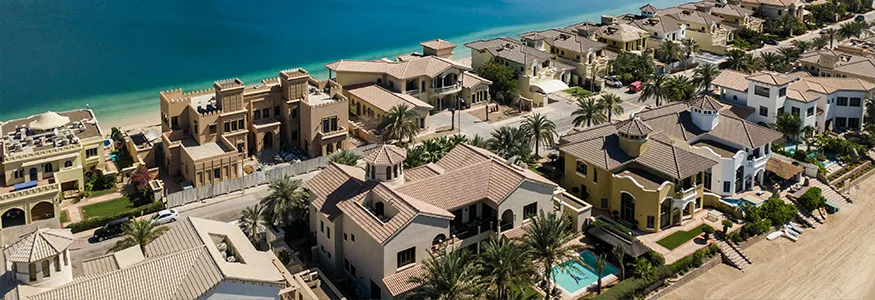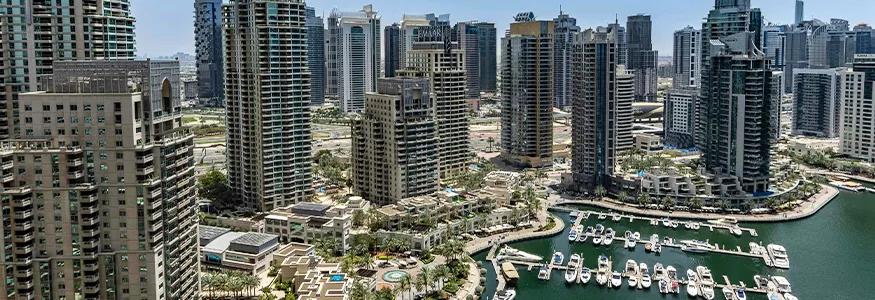

Short-Term vs Long-Term Rentals in Dubai: Which Is Right for You?
Summary
The choice between short term rent Dubai and long term rent Dubai comes down to your lifestyle and financial goals.
Short-term rentals (STRs) offer higher flexibility and income potential, especially for tourists and business travelers, while long-term rentals (LTRs) provide stability and consistent yields for families and residents.
Both options are thriving in Dubai’s dynamic property market, and understanding the differences will help you make the smartest choice.
Table of Contents
- What is the difference between long term and short term rent?
- Short term rentals (STRs)
- Holiday rentals In Dubai
- Long term rentals (LTRs)
- Pros and Cons of Short-Term and Long-Term Rentals
- Factors to Consider when choosing between Short-Term and Long-Term Apartment Rentals
- Fact Box
- Conclusion
What is the difference between long term and short term rent?
In Dubai, short-term rentals are defined as leases of less than one year. They can run daily, weekly, or monthly, and are usually fully furnished with utilities and internet included.
This setup makes them attractive for tourists on holiday, business travelers on short assignments, or students attending temporary programs.
They’re often located in high-demand, central neighborhoods close to entertainment, beaches, or business districts, making them convenient but also more expensive on a per-night basis.
Long-term rentals, by contrast, require a minimum one-year contract (sometimes longer). These properties are usually unfurnished, and tenants take on responsibility for utilities and internet. They’re more common in family-friendly communities with schools, healthcare, and supermarkets nearby.

For landlords, long-term leases mean consistent rental income, fewer tenant turnovers, and less time spent on management.
Simply put:
- Short-term = flexible, tourist-ready and higher income potential, but with more effort and seasonality.
- Long-term = steady, family-oriented, and passive income with lower risk and management needs.
Short term rentals (STRs)
Dubai’s short‑term rentals are thriving in 2025, thanks to a tourism revival that’s in full swing. The city welcomed 9.88 million international visitors in just the first half of the year, a solid 6% increase compared to the same period in 2024. With this surge, demand for flexible, fully furnished stays is booming.
- Common property types: studios and 1-bedroom apartments.
- Typical tenants’ portfolio: tourists, business travelers, international students.
- Popular areas: Downtown Dubai, Palm Jumeirah, Dubai Marina.
Did you know? Platforms like Airbnb and Booking.com have also boosted the demand for holiday home rentals in Dubai, making it one of the fastest-growing property segments.

Holiday Home Rentals In Dubai
The market for holiday rentals in Dubai is booming, driven by expats and tourists who want flexibility without the commitment of a yearly lease. According to Haus & Haus, holiday rental prices are expected to rise by 18% in 2025 for short-term stays, compared to 13% for long-term leases.
Holiday homes provide a mix of investment and leisure: owners can use them during vacant periods while generating passive income during peak tourist seasons.
Long term rentals (LTRs)
Long‑term rentals remain the bedrock of Dubai’s housing market. As of August 28, 2025, the city’s population has officially reached 4 million residents, according to the Dubai Statistics Centre, underlining surging demand for stable, long‑term housing solutions.
- Common property types: 2-bedroom apartments.
- Typical tenants’ portfolio: families, young couples, entrepreneurs.
- Popular areas: Dubai Creek Harbour, Mohammed Bin Rashid City, Jumeirah Lake Towers.
For many, long-term rentals offer peace of mind and stable housing, making them an ideal choice for residents planning to stay in Dubai for years.

Pros and Cons of Short-Term and Long-Term Rentals
| Aspect | Short-Term Rentals | Long-Term Rentals |
|---|---|---|
| Income Potential | Higher – can earn nearly 2x per day compared to LTRs | Lower – approx. half of STR yields. |
| Flexibility | High – owners can adjust prices and use property when vacant. Also allows owners to reserve property for personal stays. | Low – locked into yearly contracts. |
| Tenant Type | Tourists, business travelers, students. | Families, professionals, expats. |
| Costs | Furnishing, utilities, licensing, frequent maintenance. | Lower costs, tenants cover utilities. |
| Risk | Seasonal demand dips, regulatory hurdles. | Problematic tenants, less flexibility. |
Factors to Consider when choosing between Short-Term and Long-Term Apartment Rentals
- Financial Goals – Do you prefer high but fluctuating income (STR) or steady income (LTR)?
- Management Effort – STRs demand constant cleaning, urgent repairs, and guest management. Many owners outsource to property managers, which reduces net income. LTRs, in contrast, are more passive once the lease is signed.
- Legal Requirements – STRs require DET permits, licensing, and must comply with zoning rules. LTRs are simpler with Ejari registration and offer stronger tenant protections under Dubai’s rental laws.
- Property Type & Location – Central tourist hubs suit STRs, family-friendly areas suit LTRs.
- Flexibility vs Stability – STRs offer flexibility for personal use, while LTRs guarantee occupancy and predictable returns.

Fact Box
In Q2 2025, Dubai’s leasing market remained vibrant with over 109,000 lease agreements signed, amounting to a total annual rental value of AED 9.59 billion. This underscores sustained demand from new tenants and relocations across the city.
Source: Morgans Realty

Conclusion
Dubai’s real estate market offers opportunities for every type of landlord and investor. If maximizing short term rental income is your priority, STRs—especially in tourist hotspots—deliver high returns but demand time and attention.
If stability and peace of mind are more important, LTRs provide steady, predictable yields with fewer management headaches.
Whatever your choice, make sure to explore the following residential and commercial properties to rent in Dubai to align your strategy with the city’s thriving rental market.


